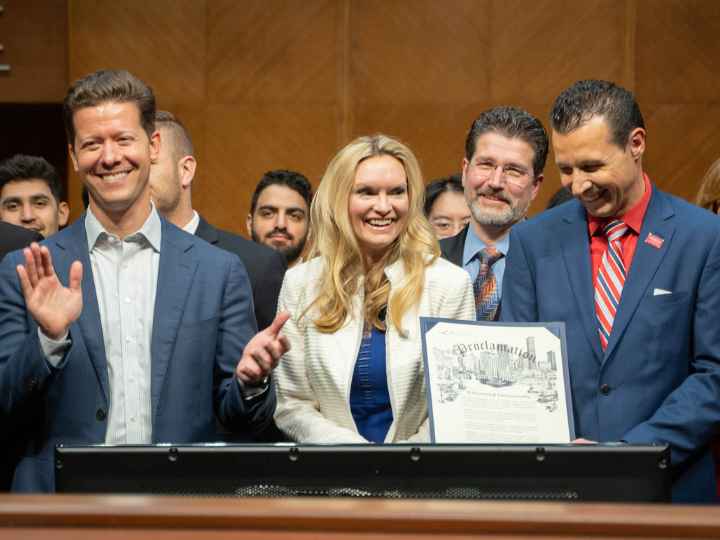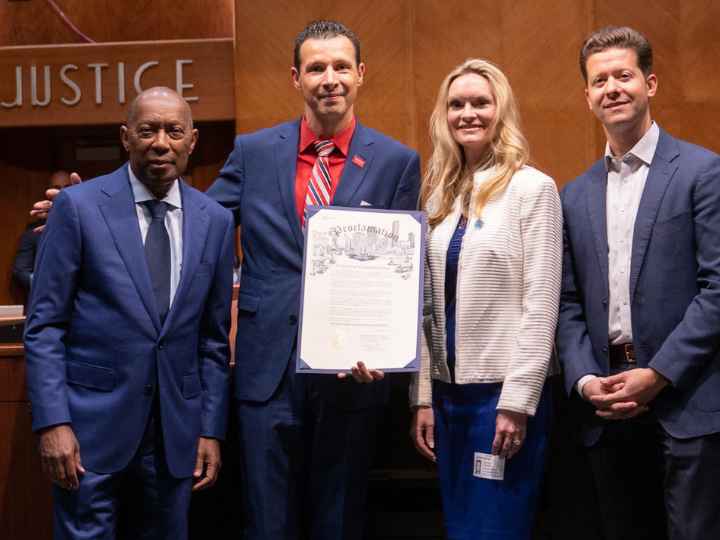

With artificial intelligence technology expanding, the University of Houston C.T. Bauer College of Business has partnered with Intel Corp. on a business certification program that prepares students for the emerging field of AI.
Artificial intelligence involves technology that empowers computers or robots to mimic humans’ higher capabilities, such as actions, reasoning and decision making. The science relies on algorithms that can copy human reactions or, on a higher level, solve problems without further intervention of people. According to some projections, AI could contribute $15.7 trillion to the global economy by 2030, which represents 26% of the global gross domestic product (GDP).
“This new AI for Entrepreneurs program, the first of its kind in the world, puts Bauer College on the leading edge of technology entrepreneurship with our students commercializing innovations in artificial intelligence with the help of the world’s largest hardware technology company, Intel,” said Paul A. Pavlou, dean of the Bauer College of Business and a Cullen distinguished chair professor of information sciences.
“In recent years there has been much discussion about what will be the next big revolution for society, something with potential to disrupt our lives then change them forever, just as the internet has done. I believe it’s clear that big revolution is AI. For this reason it’s important to provide our students with the training and skills necessary to succeed in this rapidly evolving workforce,” said Meng Li, director of the Bauer Human-Center AI Lab, associate professor and a Bauer fellow.
The first two courses of the certification program focus on AI fundamentals, digital readiness and technology usage. The third course will apply AI skills that are specific to entrepreneurship. Bauer College also is home to the Cyvia and Melvyn Wolff Center for Entrepreneurship, recently ranked for the fourth year in a row by The Princeton Review as the country’s top undergraduate entrepreneurship program.
“Our students understand that, at its core, entrepreneurship is about setting up a business for success. We know AI technologies can help a business manage its risks, while growing rapidly at scale,” Department of Decision & Information Sciences Chair Norm Johnson said. “We envisaged that with knowledge about these technologies, our students will be well-positioned to use them innovatively in entrepreneurship. For this reason, our AI-focused collaboration with Intel has created a program for students that will make them among the first to transform entrepreneurship through innovation with AI technologies.”
For Intel, long known as the world’s largest manufacturer of semiconductors and now cementing itself as a leader in AI technology, this collaboration reinforces a commitment to education and workforce development. Bauer’s 30 pioneering students and those who follow will benefit from Intel engineers’ insight, and perhaps internships for those who pursue the certification.
“Demystifying and democratizing AI is an important goal of ours. Digital readiness of people, irrespective of their location, ethnicity and gender, is key for harnessing the full benefits,” said Elizabeth McGee, Intel general manager, US public sector, state, local and education sales. “This partnership with the University of Houston reinforces our commitment to education and workforce development on AI skills as part of our RISE 2030 goal to make technology inclusive and expand digital readiness for all.”
The new AI curriculum is already making news, with Houston Mayor Sylvester Turner and City Council proclaiming Feb. 7 as AI Innovation and Entrepreneurship Day in recognition of the new program and the Wolff Center.
“We do not intend to turn all our students into AI experts, but to open their eyes to the power AI will bring to many business fields. We focus not only on the technology and its advances, but also explore AI’s potential to shape the world that is to come for all of us, from giant global enterprises to the individual consumer,” said Keran Zhao, assistant professor at Bauer and the developer and teacher of the current AI classes.
“AI has potential that we may not fully understand in our current time. No one can know exactly how it will impact us,” Li said. There can be risks, he noted, such as issues with systems’ privacy practices or a chatbot’s stereotyping. “As university researchers, we need to explore every aspect, and our students need to be prepared for AI’s real-world implications.”
The adventure drew senior Sandra Crespo, who finds inspiration in the social media coverage of computer vision engineers who create art for concerts, festivals and video gaming. “Art and computer visioning are my biggest interests,” said Crespo, a Houston-born native of Baytown and recent transfer to UH. While choosing electives, Bauer’s AI program intrigued Crespo enough to search “artificial intelligence” at her part-time public library job.
“The catalog had only two books on AI. I checked out the better one, even though it turned out to be a book for children,” she said. The current explosion of interest will not leave room much longer for such near anonymity of AI.
“I decided to sign up and was happy there were still seats,” Crespo said. She was just in time. Class enrollment was completely filled in just two days.
The pace of growth for the new program may seem dizzying, but the AI horizon is moving even more boldly. “The speed of technology is getting faster and faster,” Li said. “And with this new program, we will be leading.”